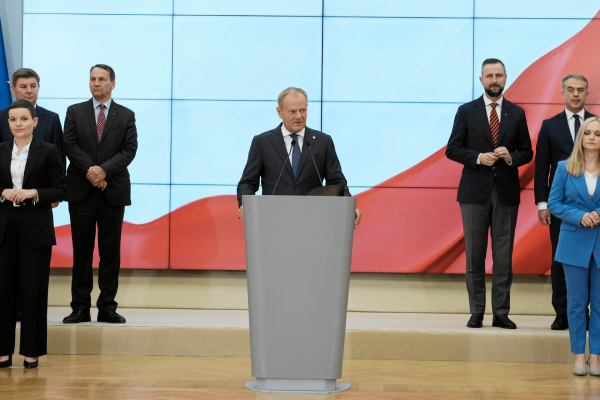A long-awaited cabinet overhaul has been announced by Polish Prime Minister Donald Tusk, who is attempting to revitalise his coalition administration in the face of low support ratings and after its loss in the presidential election last month.
Interior Minister Tomasz Siemoniak, who is still in control of the security services, and Justice Minister Adam Bodnar were sacked, among other significant changes.
Radosław Sikorski, the foreign minister, is one of the three deputy prime ministers that have been appointed.
Two new “super-ministries” covering the economy and energy have been established as part of a larger initiative to eliminate overlapping functions and shrink the size of the government.
The new ministers will be sworn in on Thursday, with the first meeting of the reshuffled cabinet set for Friday.
“There are times in every country’s history when it is necessary to recover from events that shake the political scene, stand firm on the ground, restrain emotions, and begin again with momentum and faith in one’s own strength.”
“These are frequently accompanied by necessary personnel changes,” Tusk stated ahead of the reshuffle.
In order to implement many of its promised reforms, such as increasing the tax-free income threshold, liberalising the abortion law, introducing same-sex civil partnerships, and reintroducing mortgage subsidies for first-time buyers, Tusk’s ruling coalition—a wide and occasionally shaky alliance spanning from left to center-right—has found it difficult to muster the necessary unity.
The major changes of the reshuffle include Tomasz Siemoniak of Tusk’s Civic Coalition (KO) being removed as interior minister. Siemoniak, who oversaw border and migration policy, will remain in the government as the security services minister.
He will now focus on combating “illegal immigration understood as hybrid warfare on the part of Russia and Belarus”, Tusk said, noting the importance of the tasks facing Siemoniak amid American reports pointing to “a direct threat from Russia [that] could materialise as early as 2027”.
The position of interior minister will return to Marcin Kierwiński, who briefly held the role after Tusk’s government took office in December 2023, before stepping down to run for the European Parliament. He later gave up his MEP seat to serve as the government’s plenipotentiary for flood reconstruction.
Foreign minister Radosław Sikorski, also from KO, has been appointed deputy prime minister while retaining his current role. He becomes the third deputy prime minister in the government, alongside Władysław Kosiniak-Kamysz, leader of the Polish People’s Party (PSL), and Krzysztof Gawkowski, deputy leader of The Left (Lewica).
As deputy prime minister, Sikorski will be responsible for foreign affairs, European affairs, and “difficult eastern issues”, said Tusk. “As a government, we need a very strong political figure in international relations.”
Sikorski, a veteran politician, previously served as defence minister (2005–2007), foreign minister (2007–2014) and speaker of parliament (2014–2015). He returned to the foreign ministry in December 2023 and ran unsuccessfully in KO’s presidential primary last year.
Read Also
Justice minister Adam Bodnar was dismissed following months of mounting criticism over his failure to deliver meaningful judicial reform. The overhaul was a top priority for Tusk, who had pledged to reverse changes introduced by the previous Law and Justice (PiS) government that triggered a major rule-of-law dispute with Brussels and led to the freezing of billions in EU funds.
But while the judicial reform plan has received backing from the European Commission, domestic progress has stalled. A survey by SW Research on behalf of the Rzeczpospolita daily earlier this year found that more Poles believed the rule of law has got worse than better in the year since the coalition took office.
Bodnar will be replaced by Waldemar Żurek, a long-time Kraków district judge known for his outspoken defence of judicial independence in the face of PiS’s reforms.
The government will re-establish a standalone energy ministry, combining responsibilities previously split between the climate and environment ministry and industry ministry. The new portfolio will be led by Miłosz Motyka of PSL, currently a deputy climate minister who has overseen energy and electromobility.
The move follows months of criticism over fragmented energy governance. Poland has failed to pass key legislation to boost renewables and is a year behind in submitting an updated energy strategy to the European Union. In 2022, Poland was ranked the bloc’s least green member state.
The current climate and environment minister, Paulina Hennig-Kloska of Poland 2050 (Polska 2050), will remain in office, though the energy department will be moved out of her ministry.
Finance minister Andrzej Domański of KO will head a new economic “super-ministry” formed from a merger of the finance ministry and development and technology ministry.
“The government’s financial and economic policy must be and will be in one hand, and both domestic and foreign partners will know that there are no more side paths,” said Tusk. “Only this will give us real influence and stimulate economic growth.”
The current health minister, Izabela Leszczyna, a senior KO figure, will be replaced by Jolanta Sobierańska-Grenda, a lawyer and manager with expertise in leading and restructuring large medical institutions. “The entire health ministry will be depoliticised,” said Tusk.
More broadly, Tusk announced that, as part of efforts to “slim down” the government, there will now be 26 ministers instead of 21.
Although Tusk did not mention the equality minister, Katarzyna Kotula, during his announcement, she appeared to hint at her departure in a social media post, saying that “it was a privilege being the first Polish equality minister”.
It is unclear at the time of writing what will happen to her portfolio. Earlier on Tuesday, labour minister Agnieszka Dziemianowicz-Bąk told Radio Zet that “everything indicates Minister Kotula will continue her mission”. Asked whether Kotula would take a deputy role in the family ministry, Dziemianowicz-Bąk said only that “everything will be communicated by the prime minister”.
The rumours of Kotula’s dismissal have been met with criticism from women’s rights and LGBT+ groups, who have warned it could signal a weakening of the government’s equality agenda.
Other changes include the current head of the Industrial Development Agency (ARP), Wojciech Balczun, replacing state assets minister Jakub Jaworowski; the deputy culture minister, Marta Cieńkowska, replacing culture minister Hanna Wróblewska; the deputy agriculture minister, Stefan Krajewski, replacing agriculture minister Czesław Siekierski; and KO MP Jakub Rutnicki replacing sports minister Sławomir Nitras.






